Humans love ginger because it’s in many dishes and beverages. Almost all households store this at home. Aside from its taste, it offers vitamins and minerals.
Will animals like chickens eat this spice? You’re on the right page as this article is made to answer this question.
Can chickens eat ginger? When chickens eat ginger, they benefit from it since it’s an antioxidant, appetite stimulant, and stress reducer. This spice also keeps them fit and healthy to be free from any illnesses. Also, it stimulates the fowls’ blood flow and increases their body weight. Ginger powder can lower the cholesterol level of broiler chickens.
Many studies support this claim. For example, a study in Bangladesh suggests adding ginger extract for cost-effective broiler production. A faculty staff in Sudan studied various ginger powders for the carcass quality of chickens.
Therefore, you can start feeding your chickens with dried ginger to give them a chance to gain health benefits. To encourage you to do this, learn more about it.
Can Chickens Eat Fresh Ginger?
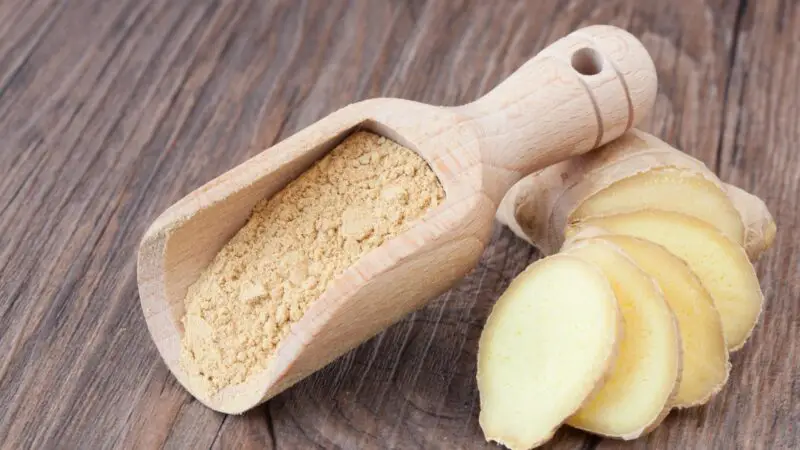
Chickens can eat fresh ginger or ginger extract, which is added to their feed. As they continue consuming it, there’s a significant increase in their weight that becomes obvious at the age of 14 to 35 days. However, you have to know that ginger loses its nutrients as it gets older.
Can Chickens Eat Ginger Leaves?
Chickens eat ginger leaves that are ground or crushed into tiny bits then added to their feed. These leaves are the remedy for stomach problems like gas and indigestion.
It should be practically given when your chickens are suffering from digestive issues. Though they can indeed relieve the stomach of your chickens, it’s advisable not to feed them too many ginger leaves.
Can Chickens Eat Ginger Root Peel?
You toss the ginger root peel, and your chickens will eat them. The peel also provides benefits like ginger flesh.
Will Ginger Hurt Chickens?
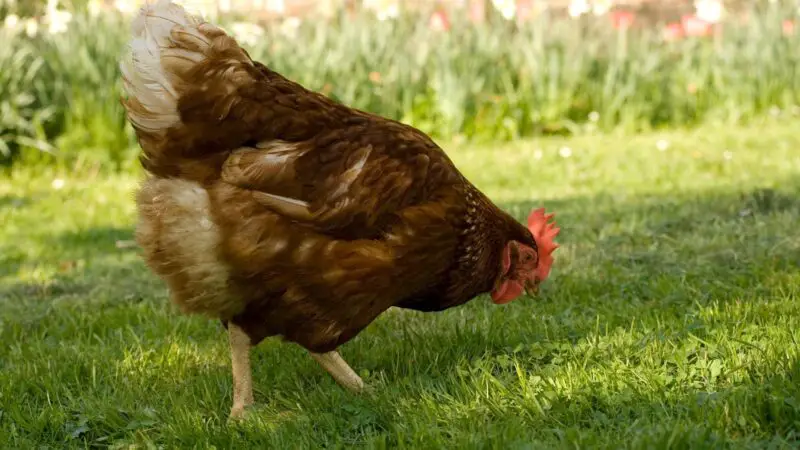
In a study about the impact of ginger on chicken’s intestine, too much ginger has adverse effects. The results show that excessive consumption can cause gastric irritation, upset stomach, heartburn, diarrhea, eructation, and dyspepsia.
It can also lead to necrosis of the intestine, liver, and kidney. The ginger powder may also cause sneezing and allergies.
These things just prove that too much of something is always bad. By taking the proper amount of ginger, chicken’s food intake and diet are enhanced.
Furthermore, there’s better digestion, so constipation is prevented. Since ginger is a natural antibiotic, it brings down the number of pathogenic microorganisms that dwell in the digestive system. Hence, it prevents the occurrence of diseases.
Health Benefits of Ginger for Chickens
Ginger contains numerous vitamins and minerals, namely iron, folate, magnesium, phosphorus, potassium, riboflavin, niacin, zinc, Vitamin B3, B6, C, and more. But it’s best to be specific with the health benefits.
- Appetite booster – Ginger is well-known as an appetite booster, and chickens can take advantage of it. Feed your chickens with small pieces of ginger when their appetite dwindles.
- Anti-inflammatory – Since it strengthens blood flow, stress is eliminated while it promotes calmness. This is how it fights inflammation.
- Anti-bacterial – Ginger proves to be a reliable natural antibiotic, so it’s the best alternative in improving the resistance of these fowls.
- Strong immune response – Ginger can strengthen the immune system of both humans and chickens.
- Healthier and higher egg production – You should know that ginger can also induce molting among hens to convert their energy into egg production. It’s done to meet the demand for egg supply. Eggs with lower cholesterol are delivered by the chickens that had ginger extract.
Can Egg-Laying Chickens Eat Ginger?
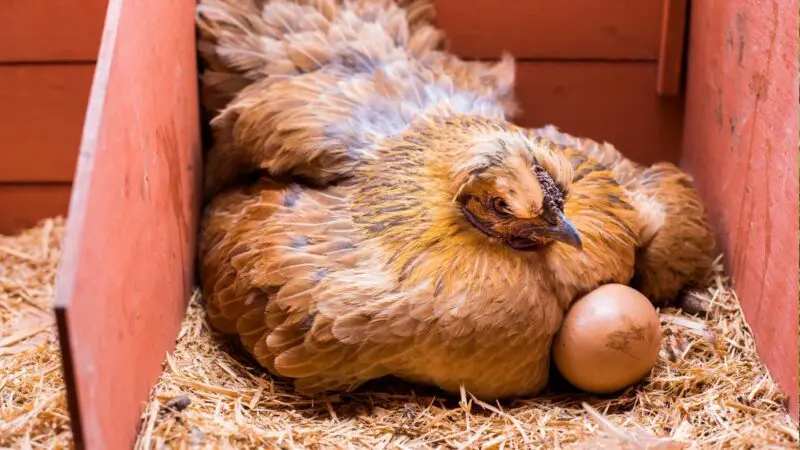
Based on the result of a study, ginger is capable of improving the laying performance of the hens.
Effects of Ginger on Egg-Laying Performance
There are positive effects of ginger on egg production as the study shows that the laying performance has improved. Hens that consumed ginger lay eggs with a higher mass compared to the ones that are produced by chickens that didn’t have ginger.
How to Feed Ginger to Chickens?
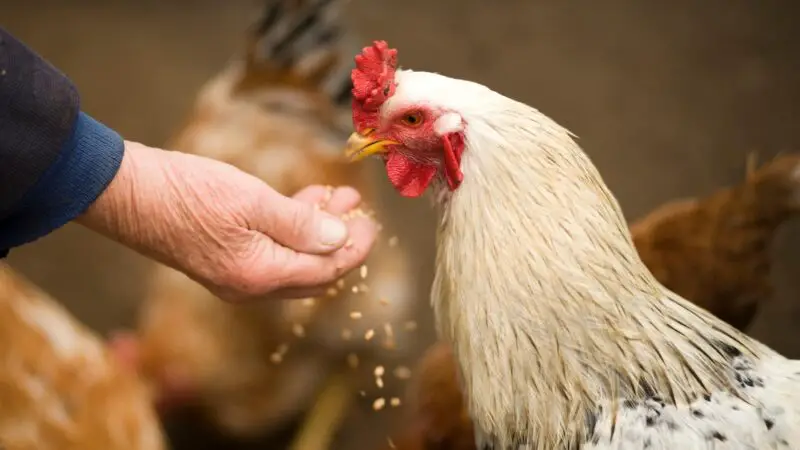
Chickens are generally not picky as they eat things that look edible for them. They continuously peck the available food on the ground. With all these obvious reasons, they can be fed with ease. Fortunately, there are different ways of feeding chickens ginger.
For example, you can grate this spice and mix it with their feed. You may also leave dried ginger for them to peck. You’re free to use fresh root or dry ginger.
How Much Ginger Can Chickens Eat?
As mentioned, too much ginger can harm your chickens. So, be careful with the portion that you give them. You can add 15 grams of ginger to a kilo of chicken feed. Don’t give this mixture every day.
How Often Can Chickens Be Fed With Ginger?
A few times a week is fine. Other herbs can be added too.
Can Baby Chicks Eat Ginger?
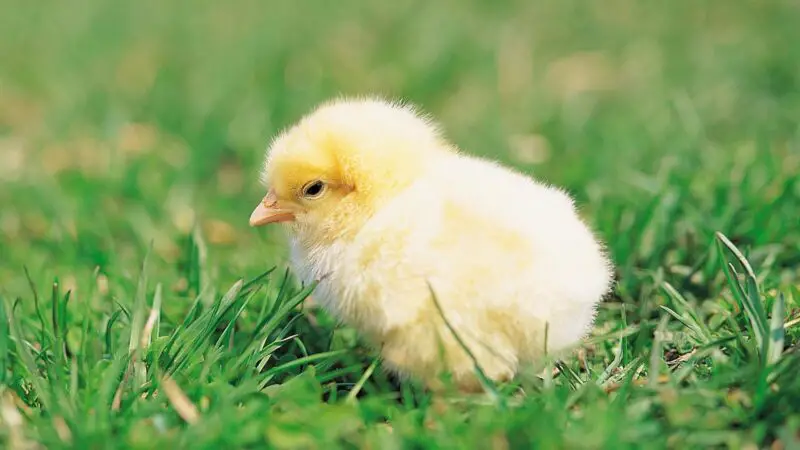
Baby chicks eat ginger as what happened in the study that involves ginger in their dietary supplementation. It’s good for them as ginger has growth promoters. Therefore, the chicks that have ginger intake are heavier than those with a controlled diet.
Other Spices and Herbs That Are Great for Chickens
When the ban on antibiotics as growth promoters of the chickens started, antioxidant defense and immune system stimulation became topical issues. Still, additives are necessary for their growth.
So, people turn to spices and herbs as replacements for the necessary supplements.
Spices and herbs contain active ingredients for the betterment of health status and production. It happens because of their roles as antioxidant, bactericidal, and immunomodulatory.
Though there are herbal formulations that you can give to your chickens like Superliv, know and collect these spices and herbs and mix them into the chicken feed.
Catnip
After the chickens consume catnip, a positive change in the mood can be noticed since it has sedative properties.
Black Pepper
This spice has enzymes that help with the digestion process. It also activates digestive liquid to eliminate infectious bacteria. Black pepper can work with other spices like garlic and hot red pepper to maximize the weight of chickens.
Cinnamon
It has shown wonderful effects in improving the respiratory system of the chickens.
Parsley
Chickens can directly eat a parsley plant as it’s their favorite. They like fresh leaves and stems. Typically, free-range chickens will munch the plant straight away. It also abounds with nutrients like calcium, zinc, magnesium, selenium, iron, and Vitamins C, B, E, K, and A.
It also functions as an aid to the development of blood vessels. In addition, it’s also beneficial to egg production. You may air dry the leaves, then crush them and add a layer to the feed.
Fennel
Just like several spices, fennel is also an insect repellent. When it comes to chicken health, fennel seeds can relieve gas bloating, sluggish digestions, and cramps. These effects are attributed to fennel’s antifungal and antispasmodic properties. It also assists in efficiently breaking down fats and enhancing appetite.
With all the health benefits delivered by fennel, improvement in weight gain, blood characteristics, and feed efficiency can be seen among your chickens.
Basil
Aside from being rich in iron and vitamin K, basil is an immunity booster for chickens. Chickens that are in the crowded or constricted coop are vulnerable to respiratory issues. This herb can alleviate the situation as it protects the respiratory tract. It’s relatively easy to grow, and you can harvest an adequate amount to feed your chickens.
Thyme
Insects don’t like this because of its strong citrusy scent. Apart from being a repellent, this aromatic herb is an antibiotic that can beat respiratory infections. Your chickens will surely have a health boost after consuming thyme.
Mint
There are quite a few varieties of mint. To name a few, they’re spearmint, orange mint, chocolate mint, and peppermint. Some add this herb into the nesting boxes. It lowers body temperature, which is essential in humans.
Mint is particularly helpful to meat chicken breeds as they are sensitive to hot temperatures. You have to get it if you’re raising Cornish Cross or other meat breeds in summer. While you enjoy mint in your drinks, the chickens will also love it when added to their waterer.
Summary
Ginger is not only beneficial to humans but to chickens as well. Interestingly, they can eat the whole ginger plant as roots and leaves are edible for them. Aside from ginger, other spices and herbs that are listed above can be added to their diet. It’s best to nurture the fowls with these natural antibiotics, as there are no side effects.
